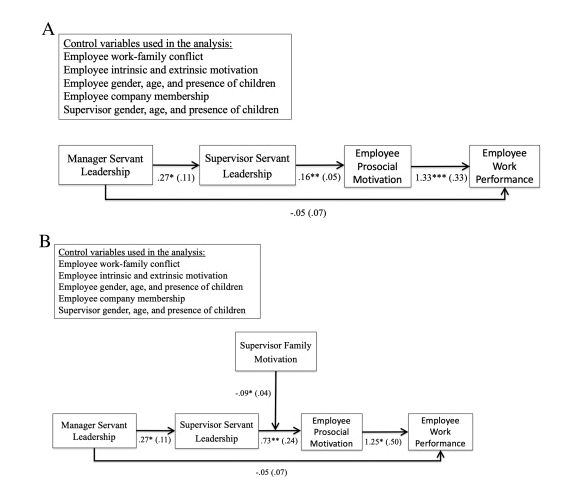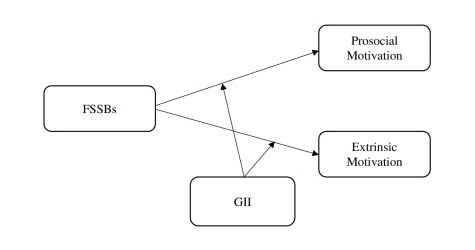Motivation
We all are purpose maximizers.
To be motivated means to be willing to exert an effort to achieve something. A person who feels no interest to act is characterized as unmotivated; on the opposite, someone who is energized to achieve a goal, to do something, is considered motivated.
There are three main types of work motivation: extrinsic, intrinsic and prosocial (Deci & Ryan, 1985). People who are motivated by extrinsic factors seek external rewards for their job, such as salary increases, promotions, and recognition. Those motivated by intrinsic factors are moved by the work itself and feel rewarded by performing the activity even “in the absence of operationally separable consequences” (Deci, 1976, p. 12). Finally, prosocially-motivated people perform actions that make a difference to other people's lives (Grant, 2007). Within prosocial motivation, there is one specific type of motivation that has been named as family motivation. See the definitions below.
Extrinsic motivation
Extrinsic motivation refers to doing something because it leads to a separable outcome –such as: status and rank, wealth, property, earning capacity, and social reputation.
Intrinsic motivation
Intrinsic motivation refers to the drive to do something it is inherently interesting or enjoyable. Intrinsic motivation remains an important construct, reflecting the natural human propensity to learn and assimilate. For people who are mostly intrinsically motivated the rewards are given by the job itself, for instance by allowing the person to develop creativity, acquire skills, and feel intellectual stimulation. Whereas extrinsically motivated people perform the job in the hope of receiving benefits granted by others, people with intrinsic motivations perform the activity even “in the absence of operationally separable consequences” (Deci, 1976, pp.12).
Family motivation
Family motivation is a potent form of prosocial motivation, as employees are more likely to be concerned about the wellbeing of their own families than that of any other group of people (Burnstein et al. 1994). Within the context of family motivation, close dependents of the employee (e.g., spouse or children) represent important motivational drivers, however the concept of family motivation may also include extended members of the family related by biological ties or social custom. Relatedly, previous studies have shown that, supporting the family is one of the main reasons for people to work). Furthermore, recent research has found that family motivation may compensate for lower levels of intrinsic motivation and trigger enhanced work performance by providing energy to the employee (Menges et al., 2017).
Prosocial motivation
Prosocially motivated individuals work to benefit significant others (Grant, 2008) and are outcome-focused in that they use their work skills and competencies as instruments to contribute to the functioning of the organization (Grant, 2008). Prosocial motivation is associated with positive workplace behaviours, such as persistence (Grant et al., 2007), a willingness to take initiative (De Dreu & Nauta, 2009), and helping behaviours (Rioux & Penner, 2001). Previous studies have focused on dispositional traits as predictors of prosocial motivation, such as empathy (Eisenberg & Miller, 1987), moral identity (Winterich, Aquino, Mittal, & Swartz, 2013) and conscientiousness (Ilies, Scott, & Judge, 2006). More recent studies have found that contextual features, such as relational job design (Grant, 2007) and collectivistic norms and rewards (Grant & Berg, 2010), may also influence levels of prosocial motivation.
Flexibility I-deals and prosocial motives: a trickle-down perspective
Abstract
Growing concerns of maintaining the best talent have contributed to the rising number of idiosyncratic deals (i-deals) at the workplace. I-deals refer to the personalised work arrangements between employees and their employers where the terms benefit both parties. Despite the acknowledgment that supervisors are key in creating i-deals, research to date has overlooked their role. Drawing on prosocial motives and social learning theory, we explore an overall model of what triggers employee flexibility i-deals and the consequences of such i-deals on employee outcomes. In so doing, we explore one of the key yet untested assumptions of i-deals theory: that they are intended to be mutually beneficial. We investigate our model with matched supervisor – employee data (n = 186) collected in El Salvador and Chile. Findings reveal that there is a positive association between supervisors’ prosocial motives and employees’ flexibility i-deals. Moreover, prosocial motives of supervisors trickle-down and shape employees’ functioning at work (i.e. work performance and deviant behaviours) and lead them to be more prosocially motivated through employees’ flexibility i-deals.
Citation
Didem Taser, Yasin Rofcanin, Mireia Las Heras & Maria Jose Bosch (2021) Flexibility I-deals and prosocial motives: a trickle-down perspective, The International Journal of Human Resource Management, DOI: 10.1080/09585192.2021.1953564
Serving followers and family? A trickle-down model of how servant leadership shapes employee work performance
Abstract
Previous studies have identified servant leadership as an important driver of organizational effectiveness. However, so far little research attention has been given to whether servant leadership displayed by leaders across an organization's hierarchy can increase the effectiveness of its members. In this study, we integrate prosociality models with role motivation theory to examine how manager servant leadership trickles down to affect employee work performance as well as the role of supervisor family motivation in influencing the trickle-down process. Using a matched sample of employees and their supervisors from three companies in the Dominican Republic, multilevel structural equation modeling results show that manager servant leadership trickles down to inspire supervisor servant leadership, which in turn increases employee prosocial motivation and subsequent work performance. Furthermore, supervisor family motivation buffers the trickle-down mechanism in that the effect on employee work performance is weaker for supervisors with high levels of family motivation. Our research breaks new ground by shedding light on how and when servant leadership trickles down to shape employee work performance.
Keywords: #ServantLeadership #FamilyMotivation #ProsocialMotivation #Work performance #Trickle-downModel
Citation
Jakob Stollberger, Mireia Las Heras, Yasin Rofcanin, Maria José Bosch, “Serving followers and family? A trickle-down model of how servant leadership shapes employee work performance” Journal of Vocational Behavior, 2019
How context matters: The relationship between family supportive supervisor behaviours and motivation to work moderated by gender inequality
Abstract
This study examines relationships between family-supportive supervisor behaviour (FSSB) and individuals' prosocial and extrinsic motivation at work in four countries: Brazil, Kenya, the Netherlands and the Philippines. With a sample of 2046 employees from these four countries, we use national levels of gender inequality, measured by the United Nations Gender Inequality Index (GII), to examine whether differences in men's and women's achievements in society moderate the relationship between FSSB and individuals' motivation at work. The study reveals that FSSB is positively associated with prosocial motivation and extrinsic motivation, and that the level of gender inequality in a country is relevant, given that GII moderates the effects of FSSB on prosocial motivation. Our results show that when GII is low, the positive effects of FSSB on prosocial motivation are stronger. We discuss the implications for theory and practice.
Keywords: #FSSB #ProsocialMotivation #ExtrinsicMotivation #GenderEquality #Cross-cultural
Citation
Bosch, M. J., Heras, M. L., Russo, M., Rofcanin, Y., & Grau i Grau, M. (2018). How context matters: The relationship between family supportive supervisor behaviours and motivation to work moderated by gender inequality. Journal of Business Research, 82 (Supplement C), 46-55




